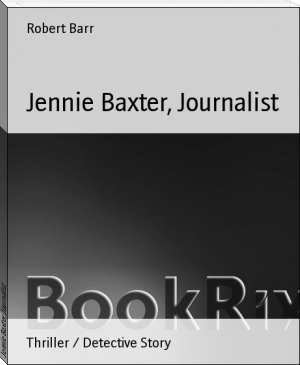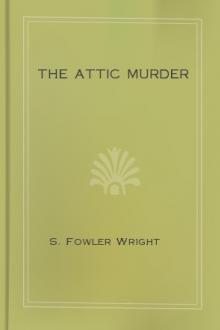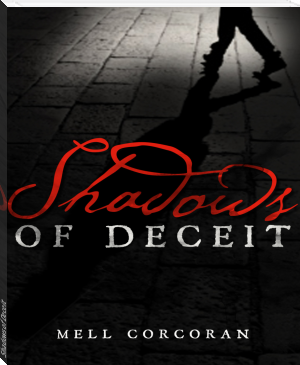Jennie Baxter, Journalist, Robert Barr [i want to read a book .txt] 📗

- Author: Robert Barr
Book online «Jennie Baxter, Journalist, Robert Barr [i want to read a book .txt] 📗». Author Robert Barr
"Is he likely to die soon? I don't suppose the Prince gave himself away for a mere million."
"Oh, you forget the diamonds. As to the likelihood of old Briggs's death, it didn't strike me as imminent when I had a conversation with him yesterday."
"Yesterday? Is he here in London, then?"
"Yes; he has come over to disentangle the mystery about the diamonds."
"And what is the mystery? You take a dreadful long time to tell a story, Mr. Hardwick."
"The story is important, and it must be told in detail, otherwise you may go on a long journey for nothing. Are you taking down what I say in shorthand? That is right, and if you are wise you will not transcribe your notes so that anyone can read them; they are safer in that form. The von Steinheimer family have two residences, a house in Vienna and an ancient castle in the Tyrol, situated on the heights above Meran, a most picturesque place, I understand; but very shortly you will know more about it than I do, because the _Bugle_ expects you to go there as its special correspondent. Here the diamond robbery took place something like two months ago, and the affair is still as great a mystery as ever. The Princess was to open the season at Meran, which is a fashionable resort, by giving a fancy dress ball in Schloss Steinheimer, to which all the Austrian and foreign notables were invited. It was just before the ball began that the diamonds were first missed--in fact, the Princess was about to put them on, she representing some gorgeously decorated character from the Arabian Nights, when the discovery was made that the diamonds were gone. She was naturally very much upset over her loss, and sent at once for the Prince, her husband, insisting that the police should be notified immediately and detectives called in, as was perfectly natural. Now here comes a strange feature of the affair, and this is that the Prince positively forbade any publicity, refusing his sanction when she demanded that the police should be informed, and yet the Prince knew better than anyone else the very considerable value of the stones."
"What reason did he give for his refusal?" asked Miss Baxter, looking up from her notes.
"I am not quite certain about that; but I think he said it was _infra dig._ for the Steinheimers to call in the police. Anyhow, it was an excuse which did not satisfy the Princess; but as guests were arriving, and as it was desirable that there should be no commotion to mar the occasion, the Princess temporarily yielded to the wish of her husband, and nothing was said publicly about the robbery. The great ball was the talk of Meran for several days, and no one suspected the private trouble that was going on underneath this notable event. During these several days the Princess insisted that the aid of the police should be invoked, and the Prince was equally strenuous that nothing should be said or done about the matter. Then, quite unexpectedly, the Prince veered completely round, and proclaimed that he would engage the best detectives in Europe. Strange to say, when he announced this decision to his wife, she had veered round also, and opposed the calling in of the detectives as strenuously as he had done heretofore."
"What reason did she give for her change of front?" asked Miss Jennie.
"She said, I believe, that it was now too late; that the thieves, whoever they were, had had time to make away with their plunder, and there would merely be a fuss and worry for nothing."
"Do you know, I am inclined to agree with her," asserted the girl.
"Are you? Then tell me what you think of the case as far as you have got."
"What do _you_ think?"
"I sha'n't tell you at this stage, because I know of further particulars which I will give you later on. I merely want your opinion now, so that I may see whether what I have to tell you afterwards modifies it in any way."
"Well, to me the case looks decidedly dark against the Prince."
"That is what Mr. Briggs thinks. He imagines his Highness has the jewels."
"Where did you get all these particulars?"
"From Mr. Briggs, who, of course, got them by letter from his daughter."
"Then we have, as it were, a one-sided statement."
"Oh, quite so; but still you must remember the Princess does not in the least suspect her husband of the theft."
"Well, please go on. What are the further particulars?"
"The further particulars are that the Prince made some quiet investigations among the servants, and he found that there was a man who, although he was a friend of his own, was much more the friend of the Princess, and this man had, on the day the ball was given, the entire freedom of the castle. He is a young officer and nobleman. Lieutenant von Schaumberg, and the Prince knew that this young man was being hard pressed for some debts of honour which he did not appear to be in a position to liquidate. The young man went unexpectedly to Vienna the day after the ball, and on his return settled his obligations. The Princess, from one of her women, got word of her husband's suspicion. She went to the Prince at once, and told him she had come to his own opinion with regard to the lost diamonds. She would, in no circumstances, have detectives about the place. Then he told her that he had also changed his mind, and resolved to engage detectives. So here they were at a deadlock again. She wrote to her father with great indignation about the Prince's unjust suspicions, saying von Schaumberg was a gentleman in every sense of the word. I gather that relations between herself and her husband are somewhat strained, so I imagine there is much more in this matter than the lost diamonds."
"You imagine, then, that she is shielding the Lieutenant?"
"Candidly, I do."
"And you are of opinion he stole the diamonds?"
"Yes, I am."
"I don't agree with you. I still think it was the Prince, and I think besides this, that he dexterously managed to throw suspicion on the Lieutenant. Have they called in the detectives yet?"
"No, they are at a deadlock, as I remarked before."
"Well, what am I expected to do?"
"Mr. Briggs cabled to his daughter--he never writes a letter--that he would come over and straighten out the tangle in fifteen minutes. He is certain the Prince stole the diamonds, but he did not tell his daughter so. He informed her he was bringing her a present of a new typewriting machine, and also a young woman from Chicago who could write shorthand and would look after the Princess's correspondence--act as secretary, in fact; for it seems the Princess has a larger correspondence than she can reasonably attend to, and she appears therefore to yearn for a typewriter. The old man tells me she is very careless about her letters, never being able to find anything she wants, and leaving them about a good deal, so he thinks she needs someone to look after her affairs; and I have a suspicion that her father fears she may leave some compromising letter about, so he wishes to ward off a divorce case."
"No, I fancy you are mistaken there. The father hasn't the slightest idea that there can be anything wrong with his daughter. It is probable the Princess has written some libellous statements about her husband, and it is quite likely the Prince is a brute and that young von Schaumberg is a most charming person."
"Well, as I was saying," continued Hardwick, "the old man cabled his daughter that he is bringing her a secretary and a typewriter. He engaged a female Pinkerton detective to enter the castle as secretary to the Princess and, if possible, to solve the diamond mystery. She is a young woman who, when she left Chicago, was very anti-English, but she became acquainted on the steamer with a young Englishman who was tremendously taken with her, and so at Liverpool she quite calmly broke her engagement with the old man and fulfilled a new engagement she had made with the young man by promptly marrying him--special license, I am told. Old Briggs has therefore a new typewriting machine on his hands, and so I was going to propose to you that you take the place of the Chicago Pinkerton person. Briggs has become so disgusted with all these detective women that he abandoned the idea of sending a female detective with the machine, and doesn't imagine that whoever is sent will be either a detective or a newspaper woman. I was introduced to him the other day by one of those lucky chances which sometimes put interesting items of news in our way, and he told me the whole story, requesting me to recommend someone who wrote shorthand and understood the typewriter. I am to dine with him this evening, and I shall cordially recommend you. I may say that Briggs has gone to that celebrated London detective Mr. Cadbury Taylor, and has engaged him to solve the diamond mystery. So you see you will have a clear field. If you can leave for the castle to-morrow night, you may have the pleasure of Mr. Cadbury Taylor's company. He isn't visiting the castle, but goes straight to Vienna; so if you work your cards rightly, you can be in the same carriage with him as far as Munich, and during that time you may find out perhaps what he thinks about the case. I know only this much about his theory, and that is he thinks the right place to begin is in Vienna, where some, at least, of the stones are supposed to have been pawned."
"Oh, this is a delightful case, and I shall enjoy it. Has there been anything published yet with reference to the robbery?"
"Not a word; nobody knows anything about it, except the Prince and Princess, Briggs, myself and yourself, and perhaps one or two of the servants in the castle--oh, yes, and Cadbury Taylor."
CHAPTER V. JENNIE MEETS A GREAT DETECTIVE.
Miss Baxter was early at the station before the Continental train left. She walked up and down the platform, hoping to see Mr. Cadbury Taylor, with whose face and form she was familiar. She secured a porter who spoke French, and pretended to him that she knew no English.
"I desire," she said, "to get into a first-class compartment with a gentleman whom I shall point out to you. I shall give you five shillings, so you must let me have your whole attention. My luggage has been labelled and registered, therefore you will not need to bother about it, but keep your eye on me and follow me into whatever carriage I enter, bringing with you the hand-bag and this heavy package."
The heavy package was a typewriter in its case. Shortly before the train departed, there





Comments (0)